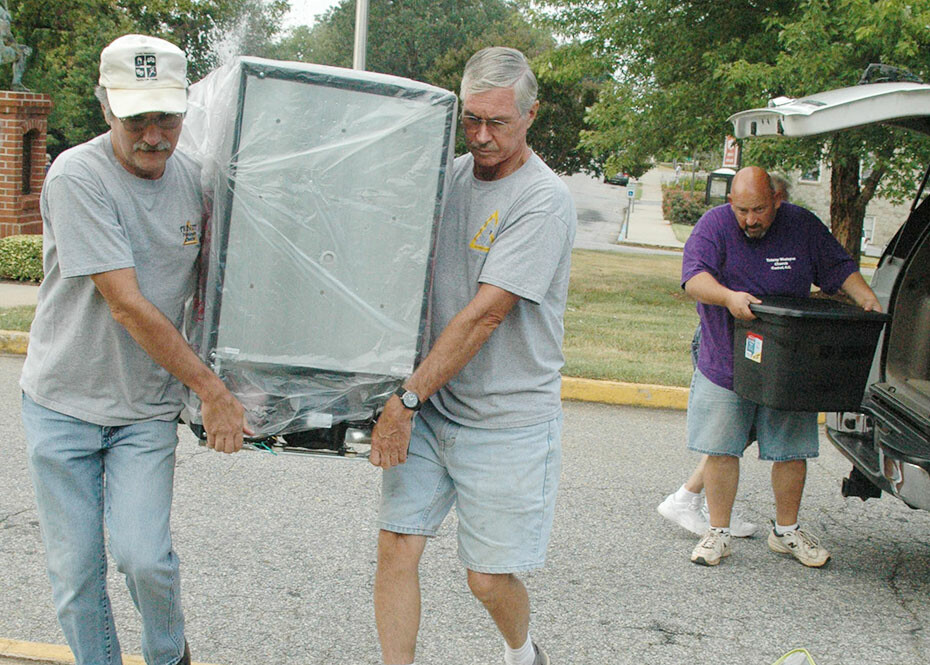New college students face anxiety, excitement

Aug 9, 2012 | Student Life
Volunteers from Trinity Wesleyan Church help students get moved into Stuart-Bennett Hall during the 2011 move in day at Southern Wesleyan University in Central. Each year, Trinity Wesleyan sends a small army of volunteers to ease the stress of unpacking for new students.
From the time they first arrive on campus, new college students experience a mixture of emotions – the excitement of new experiences mixed with fear of the unknown.
Southern Wesleyan University staff, students and volunteers do their part to take away at least some of the anxiety experienced by new students and their families – from simply lending a hand as they move in to being a mentor, available for guidance.
When incoming freshman arrive Aug. 17, volunteers from Trinity Wesleyan Church will be ready with golf carts, lawn tractors and trailers, helping to move items from an unloading area in the university’s square to their dorm room. A group of student and staff volunteers help coordinate the effort, easing the anxieties of family members who are concerned about where to park and the many details boggling a new student’s mind.
“I’ve had parents say ‘you helped us accomplish in minutes what we thought would take hours,’” said Rev. Don Milstead, pastor of Trinity Wesleyan and a graduate of the university. Milstead, whose wife and two children also attended Southern Wesleyan, understands what new college students and their families go through.
Chris Collins, residence life director and coordinator of student activities, says that new students often feel pressure when faced with decisions.
“Academics are very different in college than in high school,” said Collins, adding that incoming students have mentors who are upperclassmen who live in their residence hall. Male students each have a male mentor, while female students have a female mentor. The mentors follow a discipleship model based on Christian principles, according to Collins.
“Students ask a ton of questions. We want to dig down to the ‘why’ so we can start to anticipate things they haven’t asked yet,” Collins said.
Because coming to campus often means leaving behind family and friends, getting involved with various campus organizations is a great way to meet people and make new friends, according to Justin Carter, associate vice president of student life. Carter added that most colleges and universities have an organization fair at the beginning of the school year.
“Even if you don’t join an organization right away, it will still give you an opportunity to meet new people,” Carter said.
Carter encourages students who commute from home to hang out in popular spots on campus where they can meet other students and also to return to campus for evening events. He adds that some student organizations meet during the day, offering commuters a way to become involved in campus life.
Southern Wesleyan has an approach called Early Alert, which connects any students having academic struggles with people and resources that can help them succeed, such as tutoring and counseling. A goal of the program, in addition to getting studies back on track, is to help students realize there are faculty and staff members who care about them.
Time management becomes more important than ever to new students, according to Cory Truax, admissions counselor. Truax commented that there is a definite relationship between time spent on studies and grades earned in coursework, which affects a student’s ability to obtain scholarship money.
New students sometimes face issues when their new routine affects how they eat. Some experience weight gain, or “the freshman 15,” when offered seemingly unlimited choices in the cafeteria and temptation to snack on fast food, chips, soft drinks and pizza in the early morning hours, according to Lori Herron, university nurse. Herron suggests avoiding eating when stressed, while watching TV and studying. She also suggests choosing lower fat foods and smaller portions and encourages students to “snack healthy” by keeping fruits and vegetables handy and limiting fast food or vending machine snacks. Avoiding caffeinated drinks late in the day, getting adequate sleep and at spending at least 30 minutes walking, jogging, swimming or working out in a gym are other ways to keep weight under control and stay well.